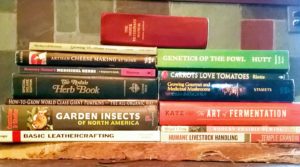Many of us trying to make a living homesteading started out making a living some other way. I obtained a Master’s of Social Work degree and worked for a family literacy agency after college. Our primary focus was to help parents who dropped out of high school to obtain their G.E.D. They could come to us as teens, or as folks many years older who just wanted help in making a better life for their family. Our mission was to make them not only graduates, but life long learners who remained curious and open to learning new things long after they passed the exam and left our program. I think that is important for absolutely everyone, and it applies in lot of ways to homesteaders and small businesspeople. Here are a few ways to incorporate a love of learning into your life!
1. Local, Regional and National Associations
Many associations help people with similar interests to network and learn from each other. In my home state of Pennsylvania, we have a couple of wonderful organizations that help to connect small farmers and those interested in farming topics. The first is PASA, the Pennsylvania Association for Sustainable Agriculture. Another great organization is PA-WAgN, the Pennsylvania Women’s Agricultural Network. They both have a regular publication or emails for members, a state-wide conference every year with members presenting ideas and stories about what they do in workshops, and offer one-day field days throughout the year at farms and businesses, sharing ideas and farming practices and offering networking opportunities.
Local business associations may be a good fit if you’re looking on more information on making the leap to being a licensed, registered business. Networking with other small businesses can help create leads if you’re looking to place what you make or grow in other retail locations. They often offer meetings or events with speakers on a variety of topics affecting small businesses and can offer a way to lobby for government changes as a group.
Nationally, there are lots of livestock registry groups that can help you learn about a breed you are interested in or are already raising. I belong to a number, such as the Purebred Dexter Cattle Association, The Livestock Conservancy, The American Rabbit Breeder’s Association, and the National Silver Fox Rabbit Club. Belonging to such associations often means reduced fees for registering or transferring registered animals, but there are other benefits. Regular publications to read, networking opportunities, and ads relevant to your specific breed may help you find mentorships or other opportunities for fostering learning. Many associations also offer publications for sale which benefit the organization and may have lots of new information to teach you. Even if you don’t breed registered livestock there are other nationwide organizations on a variety of topics, like the non-profit Seed Saver’s Exchange which offers events and publications for members interested in saving heirloom plants.
2. Extension
Every state has an extension service associated with a land-grant college. Here, it’s Penn State Extension. You may be familiar with Extension for necessary trainings, like food safety or pesticide application certifications. Topics, groups or events can range from livestock, forestry and woodland management, food production, insect identification, fruit and vegetable farming, and much more. In addition, they also have many publications, online courses and in-person classes for lots of different topics. It’s worth stopping in to your local office and introducing yourself and seeing what they can do for you.

Books are a great way to learn more about a subject that interests you.
3. Books and Videos
Full disclosure: I love books so much I have a library room in my house. I also happen to learn really well from books, as does my husband. We can pick up a how-to book and absorb what we need to get a project done. Especially in the age of the internet and Amazon, you can find a book on pretty much everything and can download it nearly instantly to a phone or other digital device. I have books on sewing, stained glass, cooking, pruning, seed saving, mushroom propagation, tattooing, working with livestock, veterinary care and (probably literally) tons more. I love physical copies I can have open while attempting something for the first time or as a refresher if it’s been awhile.
Other folks learn better by watching someone else do it and/or telling them how. Podcasts are available on nearly any subject and can fill the time while you’re commuting or weeding with learning. YouTube videos can show the finer points of something and are easily accessible. Online classes usually incorporate videos or other visual information along with texts. Some will be free and others will cost a fee.
In any field, it’s important to keep up to date on regulations and certifications and this is very true in food production and farming. Beyond that, there is a world of information that can help you be more efficient, sustainable, or open up new endeavors for you and your homestead. Being open to learning new things is an essential part of improving what you do and finding new outlets for your creativity!










